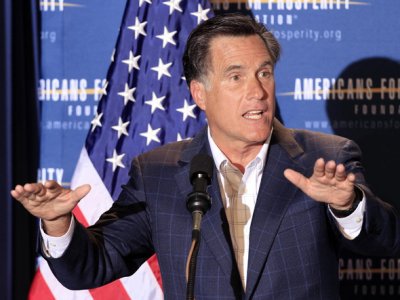
A Romney Churchill Gaffe: A Small But Not a Large Clang
Romney redux
2011— Writing for Business Insider on September 29th, Grace Wyler correctly reported a Churchill misquote by presidential candidate Mitt Romney.
Defending himself from charges that he is a “flip-flopper,” Romney confused “the Brit every Republican loves with the Brit every Republican loves to hate.” Here according to NBC is what Governor Romney said:
In the private sector, if you don’t change your view when the facts change, well you’ll get fired for being stubborn and stupid. Winston Churchill said, “When facts change, I change too, madam.”
Wyler accurately notes that this was said by John Maynard Keynes, “the British economist whose theories about government intervention in the economy [are] reviled by conservatives everywhere.” (Keynes’s actual words were: “When the facts change, I change my mind. What do you do, sir?”)
No biggie
I heard Romney’s remark with only a small clang, instead of the large one I usually hear when Churchill is misquoted. Because while Romney had the attribution wrong, he had Churchill’s sentiments right.
Churchill changed parties twice—effectively placing himself against some of the people, all of the time. He even wrote an article defending himself: “Consistency in Politics” (Nash’s Pall Mall, July 1927, reprinted in his book Thoughts and Adventures):
The only way a man can remain consistent amid changing circumstances is to change with them while preserving the same dominating purpose.
That was quite true. It is important to discern that he sometimes changed positions on a particular political issue. But moreover, he did try to maintain his dominating purposes: opposition to tyranny.
“My views are a harmonious process…”
A quarter century later, on 5 May 1952, chided for changing his mind in the House of Commons, Churchill retorted:
My views are a harmonious process which keeps them in relation to the current movements of events.
When Queen Elizabeth II was crowned in 1953, Churchill mused over his diehard support for her uncle, Edward VIII, who had abdicated in 1936 in favor of his brother, George VI, Britain’s wartime sovereign:
I’m glad I was wrong. We could not have had a better King. And now we have this splendid Queen.
A big reason why Churchill flipped so many times was the extraordinary length of his political career. He was fifty years on the scene. When after World War II, the Labour Party wished further to curb the power of the House of Lords, Prime Minister Attlee quoted what Churchill, now a Conservative, had said about the Lords in 1911, as a Liberal. Churchill had called the Lords “one-sided, hereditary, unpurged, unrepresentative, irresponsible, absentee.” Churchill replied:
Really, I do believe there ought to be a statute of limitations on my remarks. I’m willing to be held responsible for anything I’ve said for the past thirty years, but before that I think a veil should be drawn over the past.
How many politicians last long enough to make that particular request?






